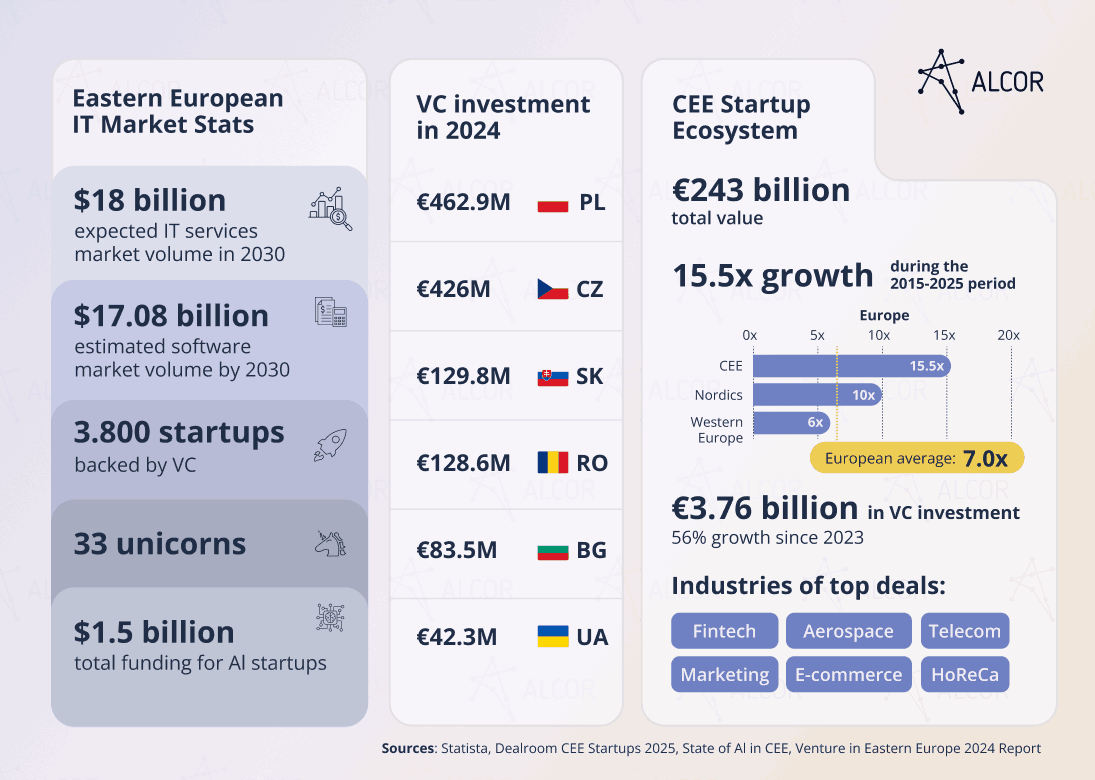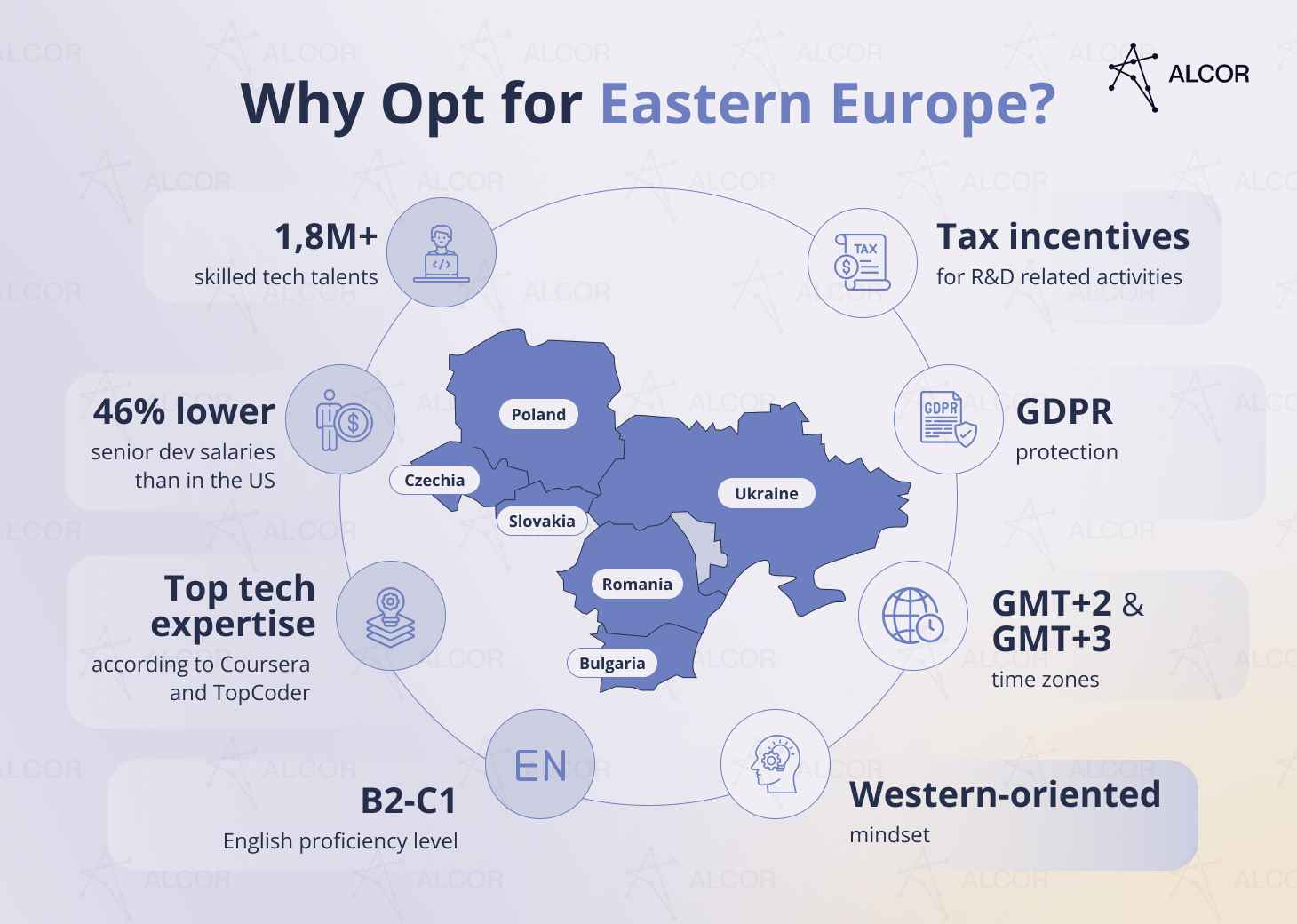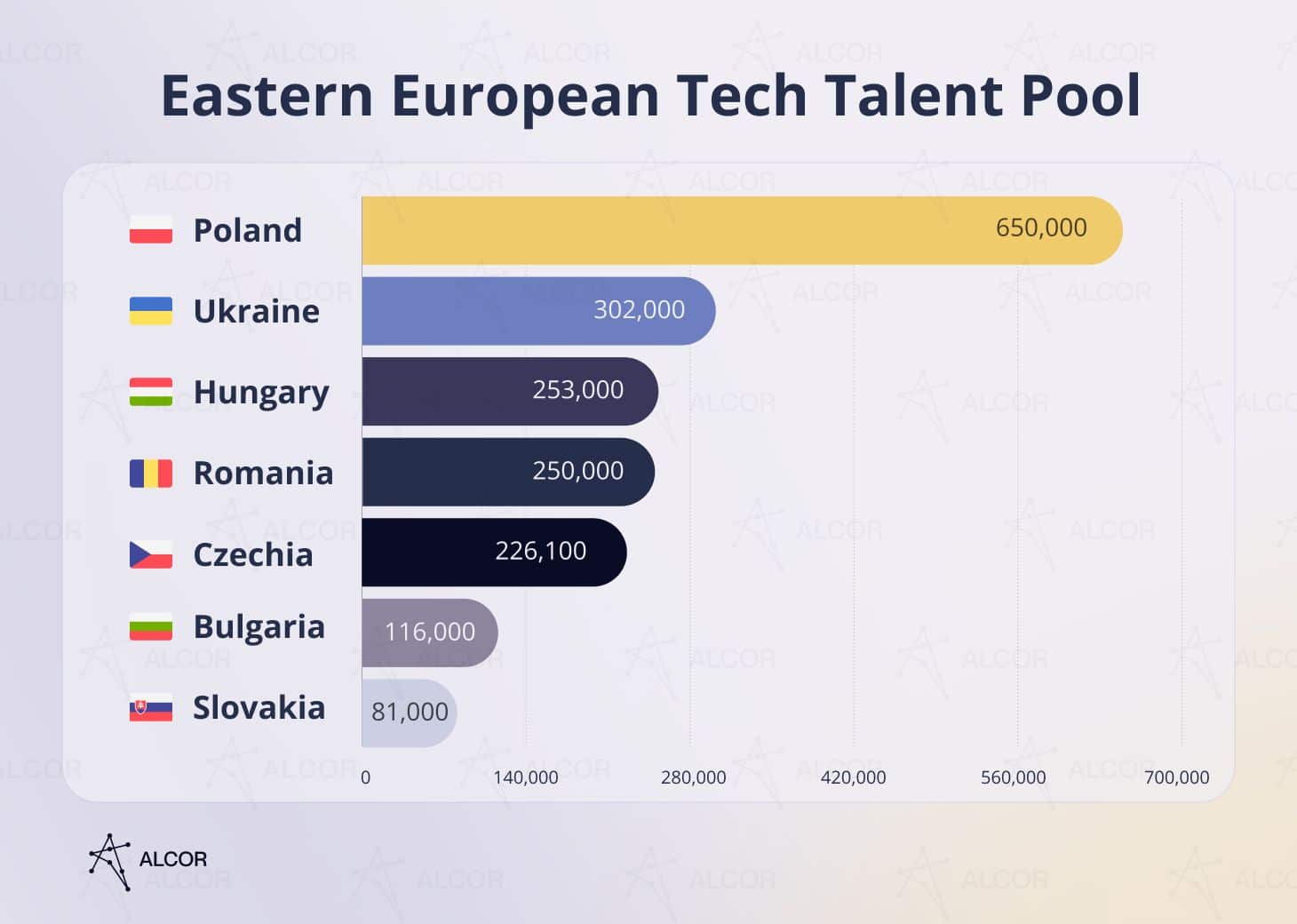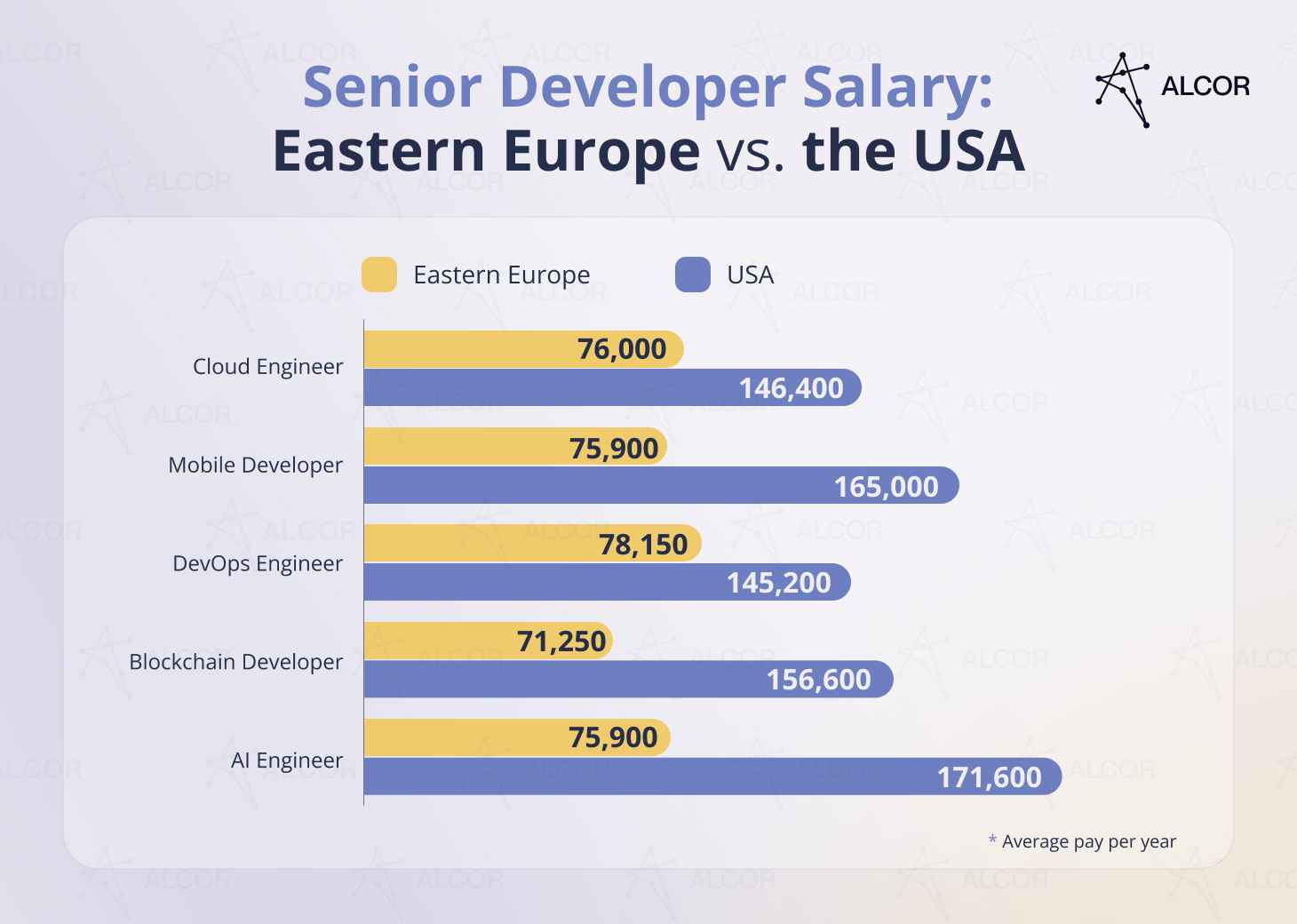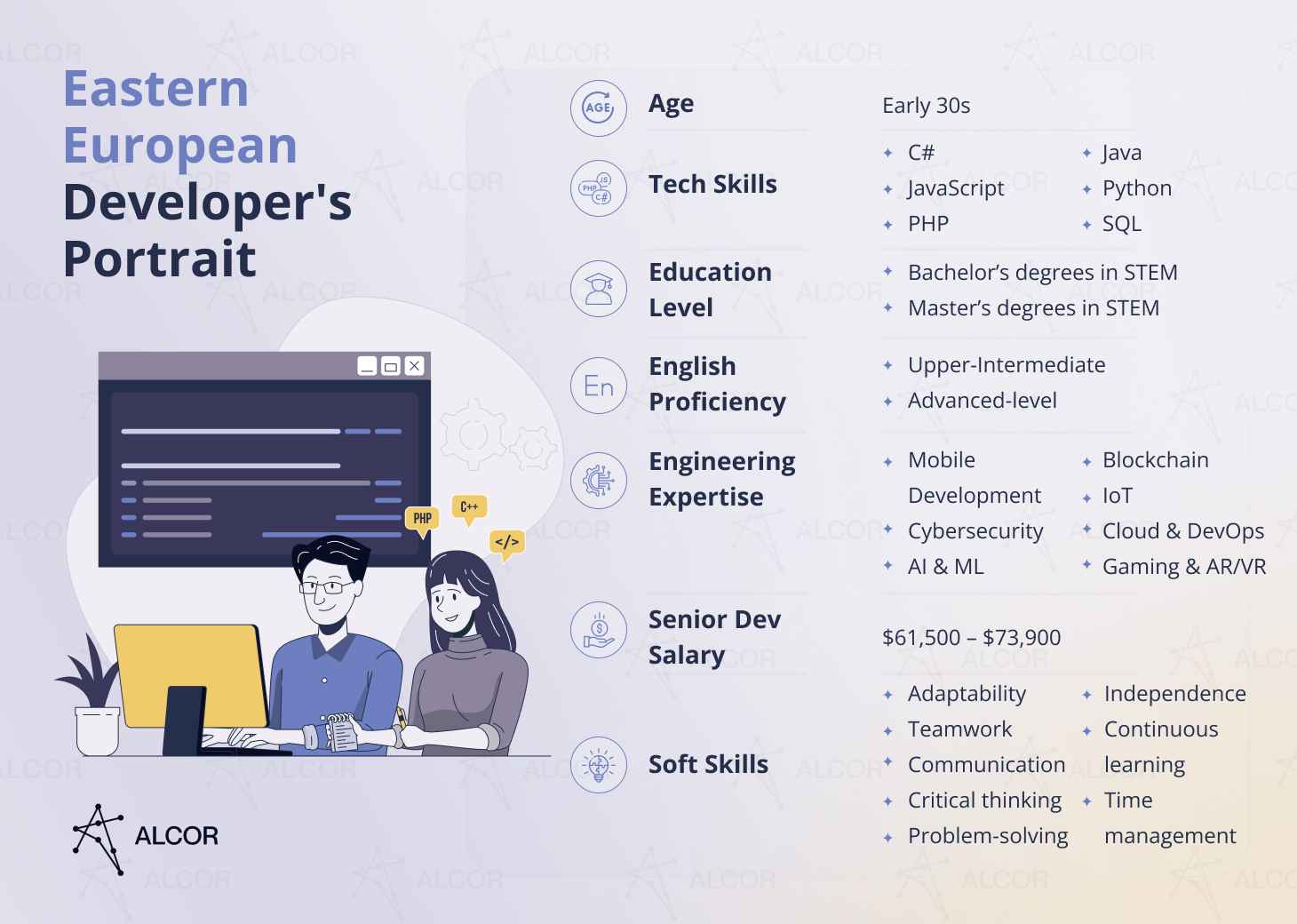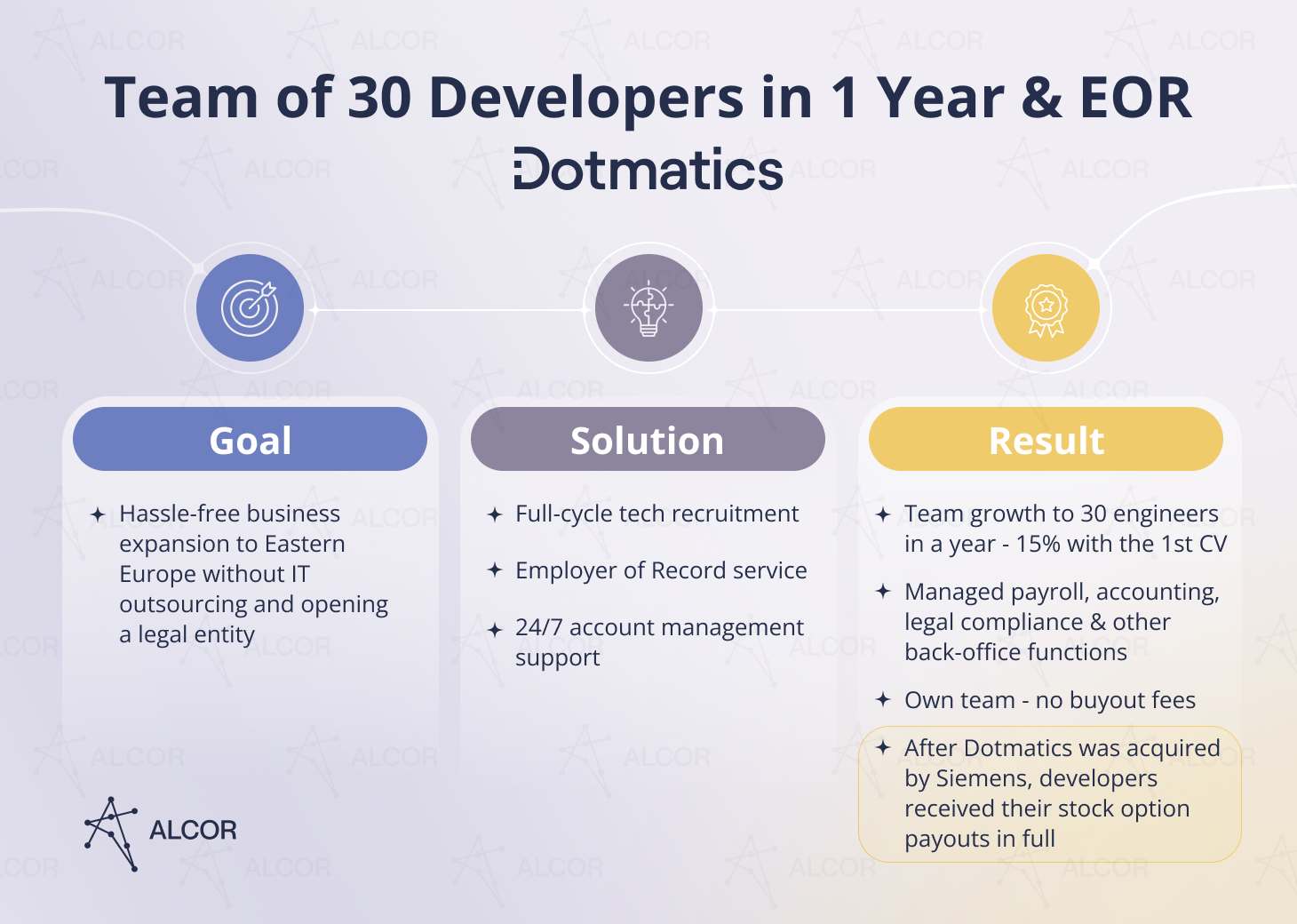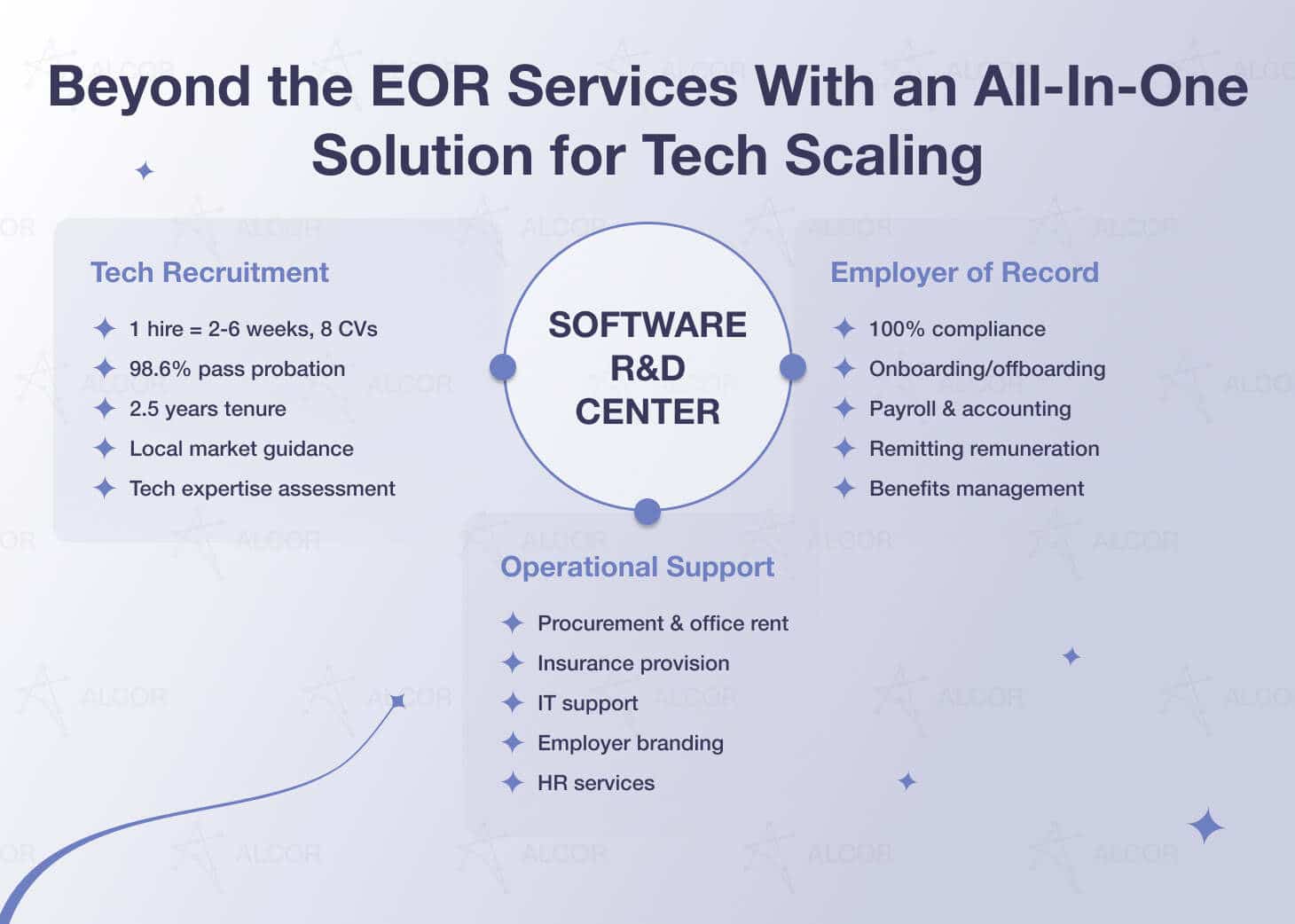Software development in Eastern Europe will show no signs of slowing down in 2026, as confirmed by Gartner. As IT spending is expected to total $5.43 trillion by the end of 2025, including a roughly 50% increase for software services, many tech companies will turn to Eastern Europe. The region offers 1.8 million developers, salaries nearly half lower than in the US, and a strong IT competitiveness.
I’m Dmytro Ovcharenko, the CEO and founder of Alcor, a software R&D accelerator. We build teams from 10 to 100 Valley-caliber developers for expanding tech companies – 40% cheaper than traditional outsourcing and with zero buyout fees.
This article will help you understand if Eastern Europe is the right choice for your 2026 expansion. You’ll gain insights into the EE software market, key reasons to do software development in Eastern Europe, and explore its top tech hubs. You’ll also discover why the tech R&D center model outperforms traditional IT outsourcing for hi-tech companies.
Key Takeaways
- The software development industry in Eastern Europe is on an upward trajectory, driven by a local startup boom, digital transformation, and increased R&D investment. With software and IT services spending expected to grow 50% by the end of 2025, market demand is projected to persist into 2026, nearly doubling in size by 2030.
- 1.8M+ tech talent pool, about 46% lower senior developer salaries, top technology and data science skills, strong STEM education, and cultural alignment are the primary reasons to choose EE for software development.
- Poland, Romania, Ukraine, and Bulgaria are the ideal destinations for software development outsourcing in Eastern Europe. They offer access to a total of over 1.3 million tech talents, rank top 7 in the region for tech skills, and provide attractive R&D incentives for tech businesses.
- Software engineer salaries in Eastern European hubs are expected to grow about 3-8% in 2026. Senior and high-demand roles in AI, cybersecurity, and cloud may witness the sharpest increase.
- As the demand for skilled developers grows and labor expenses increase, US tech companies will continue to choose Eastern Europe for software development outsourcing. Meanwhile, Deloitte emphasises the role of outcome-based partnerships, which will gradually substitute traditional IT outsourcing.
- With Alcor’s tech R&D center solution, you can set up a fully operational team of 5 Valley-caliber developers in just one month while bypassing the risks and challenges of traditional IT outsourcing in EE.
Software Development in Eastern Europe: Market Overview
The software development industry in Eastern Europe is gearing up for significant expansion, with its volume projected to reach $17.08 billion by 2030. Among the key growth drivers is increased digital transformation, with 94% internet accessibility, and the growing adoption of 5G technology. Investment in technologies and innovation also fuels the industry’s development. Currently, the Eastern European startup ecosystem is valued at €243 billion, while R&D investments are on the rise, particularly in Slovenia, Czechia, and Poland.
The Eastern European software development market is projected to experience a 2x growth, hitting $17.08 billion in volume by 2030. The enterprise software segment is the most promising to reach $8.27 billion in five years at a CAGR of 13.23%. What’s fueling EE’s market development?
1. Digital transformation
By following the European Union’s Digital Decade Policy Programme 2030, the EE countries have been actively investing and developing their ICT infrastructure, digitizing the public sector, and promoting digital inclusion. Internet accessibility already reaches 94%, while 5D technology is expected to hit 88% adoption by 2028.
One of the vibrant trends is the implementation of AI and cloud solutions, which already positions CEE countries as a hotspot for data centers, with Poland and Romania leading in the region.
2. Startup boom
Central and Eastern Europe houses over 3.800 VC-backed startups, 57 unicorns, and 275 scaleups, accounting for about 41% of Europe’s total. Its startup ecosystem is currently worth €243 billion, with EE hubs like Poland (€58 billion), Ukraine (€30 billion), and Czechia (€25 billion) contributing the most to the combined value.
EE countries secured a total of €3.76 billion in 2024, with the most funded startups with product development in the fintech, e-commerce, aerospace, and marketing sectors. According to Dealroom, among the standout startup companies were
- Rohlic, a Czech online delivery service, with €155 million,
- Rentberry, a Ukrainian rental management platform, €81 million,
- FintechOS, a Romanian AI fintech product developer, €55 million.
Meanwhile, the Eastern European startup product development ecosystem expanded with 3 new unicorns:
- Creatio (Ukraine) raised $200 million, hitting a valuation of $1.2 billion and becoming Ukraine’s 8th unicorn.
- ElevenLabs (Poland) closed an $80 million series B round, reaching a unicorn status at over $1 billion in value.
- Mews (Czechia) booked $110 million and hit $1.2 billion valuation.
3. Increased R&D investments
Through the EU’s Horizon Europe program and local governmental and business financing, CEE is actively developing its innovation and dispersing knowledge and technology.
Here are the key leaders of gross domestic expenditure on R&D in CEE:
- Slovenia hit the mark of $1.5 billion or 2.13% of national GDP in 2023.
- Czechia spent $6.2 billion, or 1.83% of its GDP, in 2023.
- Poland allocated 1.56% of its GDP, or $14 billion, on R&D, marking an 18.8% increase since 2022.
Against this backdrop, ICT services exports have surged dramatically in several Eastern European countries. A strong player is Poland, with about $42 billion in exports in 2024 – a 10.1% jump compared to 2023. Ukraine is another striking example: even amid war, its ICT sector accounted for 37.4% of its total exports. This proves software outsourcing to Eastern Europe continues to gain traction.
Why Tech Business Moves Software Development to Eastern Europe
Eastern Europe is a prime destination for software development due to its:
- massive talent pool of 1.8M+ tech professionals, led by Poland and Ukraine
- developer salaries that are 46% lower than in the US
- top-tier tech expertise, with developers excelling in mobile and web development, AI, data science, DevOps, and cybersecurity, while ranking high in competitions like Top Coder and Meta Hacker Cup,
- a strong STEM education system, which brings 124,000 graduates annually
- cultural affinity with Western business ethics and high proficiency in English.
Reason #1. 1.8M+ tech talents
Yes, you heard it right, the Eastern European region boasts a massive pool of tech professionals with diverse skill sets and expertise. At the talent list, there is Poland, boasting 650K developers. Ukraine secures the second spot with a pool of 302K programmers, followed by Hungary and Romania with 253K and 250K software engineers, respectively.
The benefit? A possibility to find even the rarest tech talent and reduce time-to-hire. That’s exactly what our client Mako (formerly A2Labs) experienced. They were seeking developers in Eastern Europe with niche GPU optimization skills to develop their LLM-powered AI platform. And Poland was chosen as the most talent-rich hub. With the help of Alcor’s local tech recruiters, Mako got several senior ML specialists within just a few weeks, accelerating their AI roadmap with top-tier expertise.
Reason #2. Budget-friendly salaries
Silicon Valley price tag? Not even close! The average senior software engineer salary in Eastern European hubs ranges from $61,500 to $73,900 per year. Ukraine and Bulgaria offer even greater savings – about 16% and 15% compared to Poland and Romania. For instance, senior AI Engineers earn $75,600 in Bulgaria vs. $81,000 in Poland. Mobile Application Development experts make $72,000 in Ukraine vs. $81,600 in Romania. Compare the rates yourself:
|
Annual Senior Developer Compensation, USD |
|||||
|
Position |
Poland |
Romania |
Ukraine |
Bulgaria |
|
|
AI Engineer |
81,000 |
78,000 |
69,000 |
75,600 |
|
|
Blockchain Developer |
84,000 |
81,000 |
60,000 |
60,000 |
|
|
Cloud Engineer |
81,000 |
84,000 |
69,600 |
69,600 |
|
|
Mobile Developer (iOS/Android/Xamarin) |
78,000 |
81,600 |
72,000 |
72,000 |
|
|
DevOps Engineer |
87,000 |
81,600 |
72,000 |
72,000 |
|
|
Salesforce Developer |
70,800 |
72,000 |
54,600 |
51,600 |
|
|
IoT Developer |
86,400 |
83,400 |
70,000 |
65,000 |
|
|
Automation QA |
75,000 |
72,000 |
52,800 |
53,400 |
|
|
Ruby Developer |
79,800 |
81,600 |
72,000 |
72,000 |
|
|
Java developer |
81,000 |
81,600 |
69,000 |
72,000 |
|
|
Python developer |
81,600 |
81,000 |
72,000 |
72,000 |
|
Now, consider that the average annual salary for a senior developer in the US is about $125,500 – nearly double the price compared to the average Eastern European developer salary of $67,500. That’s free money that you could invest in your product development instead. See yourself:
But what about the quality of the software development?
Reason #3. Top tech expertise
It’s top-tier, as Eastern European software developers are real technology ninjas. Whether it’s Meta Hacker Cup or Google Code Jam, they always rank high. Coursera and TopCoder back up the tech savviness of the developers from Eastern Europe:
- Coursera’s top for tech skills in EE: Slovakia, Czechia, Poland
- TopCoder’s top for tech skills in EE: Poland, Ukraine, Romania
Software developers in Eastern Europe will be a great asset to your engineering team, bringing the most value in mobile app development, web development, data science & AI, cloud & DevOps, and cybersecurity. They also demonstrate a broad palette of coding languages and frameworks:
- Poland: JavaScript, Java, Python, TypeScript
- Romania: PHP, C#, Java, C++, Python
- Ukraine: JavaScript, Java, C#, Python, and TypeScript
- Bulgaria: C#, JavaScript, Java, and Python
Reason #4. Strong STEM education
Profound tech know-how of software developers from Eastern Europe comes from a long-standing tradition of solid STEM education. More than 300 higher educational institutions offer ICT programs, with over 80 of them ranking in the QS World University Rankings 2025. Among them are Warsaw University of Technology, Taras Shevchenko National University of Kyiv, Czech Technical University in Prague, and Babes-Bolyai University, to name just a few.
The region generates over 124,000 STEM graduates annually. In Poland, 76% of software developers hold a higher education degree, while in Ukraine, this rate reaches 90%. But formal education is not the only way programmers in Eastern Europe gain tech savviness. Coding schools, courses, and bootcamps are also in common practice. Some of the most popular include Coders Lab in Poland, Skylab Coders Academy in Ukraine, Coding Bootcamp Praha in the Czech Republic, and Bucuresti School of Code in Romania.
Reason #5. Cultural proximity
When assembling Eastern European development teams, the cultural aspect is undoubtedly one of the most essential ones. And these programmers will fit your team as seamlessly as missing puzzle pieces, ensuring effective communication and productive cooperation.
- Effective communication: Forget about a language barrier, as most programmers from Eastern Europe have high English proficiency, with Romanian, Polish, and Bulgarian devs topping the list. It’s also common for these engineers to be fluent in an additional European language, like German, French, or Spanish.
- Western mentality: Tech talent in Eastern Europe shares the same values and work ethic as their colleagues in the US, meaning they can easily integrate into your corporate culture and teams and adapt to new working conditions – another good reason to hire developers in Europe, particularly in Poland, Romania, Ukraine, and Bulgaria.
Software Development in Eastern Europe: Key Challenges
Outsourcing software development to Eastern Europe may seem cost-effective at first, but it often becomes expensive due to hidden fees and inflated rates. Developers remain employees of the vendor, leaving no room for integration. High buyout fees and IP risks make it difficult to bring talent in-house. Overall, traditional IT outsourcing reduces control over product development, creating ongoing challenges for growing tech companies.
Cloudy pricing
While initially appearing as a cost-effective choice, Eastern European software development outsourcing services often become a financial burden over time. Most vendors use a “bench” staffing approach. They present you with rate cards that already include around a 50% markup to cover idle developers who aren’t even working on your project.
Unexpected costs are also common. Regular cost increases with no visible returns are also a common practice. Outsourcers often impose additional fees for unnecessary services without providing transparent communication to the client. Consequently, the final invoice often surpasses the initially anticipated cost significantly.
And the icing on the cake is high buyout fees and legal obstacles for insourcing tech talent, with a risk of losing ownership over your IP.
Team dedication
Even if you cooperate with Eastern European top software development companies that call themselves software houses, it doesn’t guarantee a genuine commitment from the developers assigned to your project. Ultimately, they remain official employees of your outsourcing vendor, not your company.
This means you can’t influence their performance, motivation, compensation, or integrate them into your culture and practices. Moreover, assigned tech experts usually collaborate with multiple companies, frequently switching between projects and emphasizing productivity over dedication.
Lack of control
When you engage in traditional software development outsourcing in Eastern Europe, you give up all control over your product development and team management. This limits your ability to promptly assess project performance, implement necessary changes, or align your product with evolving business requirements.
You also lose control over the engineer’s allocation. A key contributor can be reassigned without notice, which can slow your product development and disrupt continuity.
Top Software Development Destinations in Europe
Eastern Europe has emerged as a powerhouse for tech expansion, offering a rare mix of affordability, innovation, and business incentives. Poland, Czechia, and Romania lead the region in IT market growth, while Poland, Ukraine, and Czechia boast the most dynamic startup ecosystems. For companies seeking cost efficiency and tax benefits, Ukraine and Bulgaria are ideal choices.
Poland
- 650K+ tech professionals
- 42% lower senior dev salaries vs. the US
- #3 in the EE region for tech skills
- #2 in EE for English proficiency
- #4 innovative economy in EE
IT services market: Sometimes referred to as the tech capital of Eastern Europe, Poland’s software development market is already getting to the mark of $10.44 billion in revenue, expected to grow by 20.5% by 2029. Meanwhile, Poland’s IT exports have grown at an annual rate of 13.64% over the past five years.
Startup landscape: With over 3,000 startups and the most unicorns in the region, Poland’s startup ecosystem developed at 10.6%, securing its 4th place in the region for the second year in a row. What’s impressive is that its AI startups attracted the highest amount of funding in the region – $172 million. Except for AI, Poland is also strong in e-commerce, fintech, marketing and sales, healthcare, and IoT.
Business friendliness: The Polish ICT market lures many international tech companies to its shores with favorable R&D incentives, namely 200% tax deduction on eligible R&D expenses. Plus, there is the possibility of cooperating with Polish developers on B2B terms, where client companies are exempt from paying taxes and social contributions.
Ripe tech hubs: Warsaw, Krakow, Wroclaw, Katowice, and Tricity are home to over 62% of all software developers in Poland.
Romania
- 250K+ tech professionals
- 42% lower senior dev salaries vs. the US
- #6 in the EE region for tech skills
- #1 in EE for English proficiency
- #6 innovative economy in EE
IT services market: Romania’s ICT industry is forecasted to account for a whopping 10% of the national GDP by 2030. And it’s no surprise as its IT services will most likely generate a revenue of $1.38 billion in 2025, growing at a CAGR of 6.78% over the next five years. IT outsourcing is a leading segment in the market with a volume of $506 million.
Startup landscape: As one of the top 10 Eastern European tech ecosystems, Romania boasts over 1,662 startup companies and scale-ups, valued at €19 billion. Unicorns? There are three of them: UiPath, eMAG, and MultiverseX. The best-performing sectors are ICT, fintech, media, marketing, and gaming.
Business friendliness: Tech companies innovating in Romania enjoy a profit tax exemption for the first 10 years, a 50% deduction of the eligible R&D expenses, and can also apply for accelerated depreciation for R&D equipment.
Ripe tech hubs: Bucharest, Cluj-Napoca, and Iasi together account for 86% of the ICT revenue in the country.
Ukraine
- 302K+ tech professionals
- 51% lower senior dev salaries vs. the US
- #7 in the EE region for tech skills
- #8 in EE for English proficiency
- #7 innovative economy in EE
IT services market: Despite the ongoing war, the IT market in Ukraine continues to steadily increase in revenue, demonstrating an average annual growth rate of 8.2% and contributing 4.4% to the national GDP. New tech companies? A 5.9% jump since 2024 – a vivid sign of the country’s resilience. Its capital, Kyiv, houses over 52% of all tech businesses in the country. Recognized as the fastest-growing ecosystem by Dealroom, it can rightfully be called the rising Silicon Valley of Europe.
Startup landscape: Ukraine’s startup ecosystem is among the three fastest-growing in the CEE region. The number of startup companies increased to over 2,600 in 2024 – a tripling of the ecosystem’s value since 2020. Over the past 6 years, Ukrainian tech companies have raised almost $1.5 billion in venture capital. And last year’s superstars are Creatio and Rentberry, which together raised $290 million in funding, both achieving unicorn status.
Business friendliness: Ukrainian special legal and tax framework, Diia.City is designed specifically for tech companies. It offers some of the lowest tax rates in Europe, IP protection, stable business regulations, and tools for scaling tech businesses. Currently, it hosts 1,650+ residents, including companies Visa, Rakuten Viber, Samsung, and Capgemini. Additionally, you can hire software developers via any of the 3 cooperation formats: employment contracts, gig contracts, or B2B contracts, enjoying the flexibility your tech business needs.
Ripe tech hubs: Kyiv, Lviv, Odesa, Dnipro, and Kharkiv secure 78% of all software developers in Ukraine.
Find out why nearshore software development to Ukraine is beneficial for tech product companies from the US and Europe.
Bulgaria
- 116K tech professionals
- 51% lower senior dev salaries vs. the US
- #4 in the EE region for tech skills
- #3 in EE for English proficiency
- #3 innovative economy in EE
IT services market: Thanks to significant government investments in digital transformation, Bulgaria’s ICT services sector has seen remarkable growth, with an 18.6% increase in turnover from 2020 to 2021. And now its IT services market is expected to hit $463.30 million in revenue and contribute over 4.5% to Bulgaria’s GDP.
Startup landscape: With over 800 startup companies, Bulgaria ranks 7th in the region for its startup ecosystem. Among the key industries of Bulgarian startups are software & data, fintech, social & leisure, and healthtech. AI is a rising star in the local market, which already attracted $112 million last year.
Business friendliness: Bulgaria stands as a tax-friendly haven in the EU with a flat 10% rate for both personal and corporate income taxes, making it increasingly attractive for Western companies to explore Eastern European software development options.
Ripe tech hubs: Sofia, Burgas, and Plovdiv, among which Bulgaria’s capital accounts for 87% of all local startups.
Czechia
- 226K tech professionals
- 43% lower dev salaries vs. the US
- #2 in the EE region for tech skills
- #6 in EE for English proficiency
- #1 innovative economy in EE
IT services market: The software development industry in the Czech Republic is on the roll, growing at a CAGR of 9.7% between 2020 and 2025. Currently, its tech industry ranks #13 in Europe for revenue, estimated to bump up to $6.47 billion in 2025. The biggest slice of the pie? IT outsourcing is forecasted to reach $2.52 billion in market volume.
Startup landscape: Having the most innovative economy and being the 3rd largest startup ecosystem in the region, Czechia contributes over $27 billion to the combined enterprise value of the CEE startup ecosystem. Last year, it attracted a total amount of over $293 million for the recorded rounds. One of the six Czech unicorns, Rohlik, made the biggest contribution to the total funding of around $177 million.
Business friendliness: International tech companies can unlock major savings in Czechia with its R&D tax incentives. You can deduct up to 100% of R&D expenses from your tax base, on top of the standard deduction, essentially writing off R&D costs twice. On top of that, if your current R&D spending exceeds the previous year’s, you get an extra 10% deduction. For large companies, this results in a 21% effective tax subsidy on R&D, making innovation significantly more budget-friendly.
Ripe tech hubs: Prague, Brno, and Ostrava, with Czechia’s capital hosting 65% of all startups in the country.
Unlock more insights into this region by reading our article on tech hubs in Eastern Europe!
Slovakia
- 81K tech professionals
- 45% lower dev salaries vs. the US
- #1 in the EE region for tech skills
- #5 in EE for English proficiency
- #5 innovative economy in EE
IT services market: The Slovak ICT market is rapidly and vigorously developing, with projections indicating it may surpass the $1 billion mark this year and further develop at a CAGR of 6% over the next 5 years. At the heart of this boom is IT outsourcing, set to hit almost $600 million.
Startup landscape: As one of the top 20 startup ecosystems in the region, Slovakia is making decisive progress, growing at nearly 24% since 2024 and having already experienced a 2.2 times increase in combined enterprise value over the past 5 years. Most startup companies work in marketing & sales, software & data, ecommerce, edtech, and fintech. Notably, AI startups alone attracted $41 million in investments.
Business friendliness: Slovakia offers a range of appealing tax incentives for tech product companies. The income tax rate here is only 21%. Furthermore, there is an enticing additional benefit of a 200% deduction on R&D expenses from the taxable base – more money to innovate and grow.
Ripe tech hubs: Bratislava and Kosice, with Slovakia’s capital hosting 73% of all startups in the country.
Eastern European Developer Salary Forecast for 2026
Software engineer salaries in Eastern European hubs are projected to increase in 2026, with the sharpest growth for senior roles. This is already evident in Poland and Ukraine, where compensation for mature tech talent has been steadily growing year-over-year. High-demand roles, such as AI MWP, Cybersecurity, and Cloud engineers, may see a salary jump of about 5–12%. Romania, Bulgaria, and Ukraine are anticipated to see further increases in B2B contractor rates due to tax reforms and currency fluctuations.
Considering hiring engineers from Eastern Europe as a part of your 2026 expansion strategy? According to our internal market research, here is how the Eastern European developers’ salaries may change in 2026:
- Poland (PL): +3% to +6% nominal salary growth; +5% to +8% for senior and in-demand talent.
Developer salaries in Poland remained mostly flat throughout 2025, with B2B contractors experiencing a slight decrease in their compensation, according to the Bulldogjob report. However, the rising demand for software engineers this year may trigger an upward trend in 2026 salary dynamics.
Job postings in tech jumped 68% in the first half of 2025 compared to the same period in 2024. According to Just Join IT, AI and data analytics roles drove this spike, with over 52% of vacancies requiring senior experts. This means mature tech talent and experts with in-demand or rare skills will most likely see some salary bumps in 2026.
Meanwhile, the growth of the national wage by 7.1% y/y in August 2025, and Poland’s inflation to moderate from 3.6% to 2.8% in 2026, both forecast positive dynamics for the developer’s salary in Poland.
- Romania (RON): +4% to +8% nominal salary growth; +6% to +10% for B2B contractors and in-demand talent.
Since the Romanian tech market is primarily represented by outsourcing (approximately 70%), developers’ hourly rates will be tied to global benchmarks and influenced by vendors’ markups. This may result in slight reward jumps. A moderate skill shortage is another factor that may contribute to salary growth for in-demand specialists, such as those in AI, cloud, and cybersecurity.
The net income of developers employed on a full-time basis (FTE) declined slightly after the IT income tax exemption was abolished in January 2025. In a Brainspotting survey, 28% reported their salary decreased. In contrast, the rewards of B2B contractors may increase slightly due to the tax on SRL dividends climbing from 10% to 16% in 2026.
Learn how to hire offshore developers in Eastern Europe without red tape!
- Ukraine (USD): 6% to +10% nominal salary growth; +8% to +12% for senior+ and in-demand roles.
As Ukraine is moving towards a product-oriented tech industry, the salaries of developers working in product tech companies are rising. According to the programmers community, DOU, the median salaries of middle developers increased by $100, and those of Lead/Principal/Staff by $250 during the first half of 2025.
In general, high-experience roles continue to grow, showing $150–$500 increase in 2025. If the demand for senior roles continues to strengthen, their salaries may see additional growth in 2026. Yet, if comparing software engineer salaries in Eastern European locations, Ukrainian wages remain the most affordable.
In case of a devaluation of the Ukrainian hryvnia, the equivalent salary in USD will increase. If inflation remains between 8% and 10% (6.6% forecast for 2026), salaries paid in UAH may index upward to keep pace with the cost of living. Additionally, any drastic changes in the war could impact Ukraine’s attractiveness to foreign tech companies and investors, triggering fluctuations in developers’ salaries, both positively and negatively.
- Bulgaria (BGN): +4% to +8% nominal salary growth; +8% to +12% for B2B contractors and in-demand talent.
Throughout 2025, Infrastructure positions (Cybersecurity, Database Engineer, DevOps), AI/ML, and Data Science experts were the highest paid in Bulgaria, according to the DEV.BG report. Since their demand is expected to continue in 2026, salaries may experience additional growth.
Software developers on B2B contracts are likely to see a slight increase in their rewards in 2026 due to Bulgaria’s entrance into the eurozone, which will lead to some “rounding up” of costs. A lower inflation rate of around 1.8% and year-over-year growth of the average wage in Bulgaria (currently at 12%) will also contribute to possible tech salary increases. Despite these upward forecasts, Bulgarian tech wages remain some of the lowest compared to other Eastern European developer salaries.
Will Software Development Outsourcing to EE Still Be a Trend Through 2026?
Outsourcing software development in Eastern Europe is expected to remain strong in 2026, driven by the global tech talent shortage, rising developer salaries in the US, and the need for scalable teams in innovation-intensive fields such as AI, robotics, and cybersecurity.
However, according to Deloitte, traditional outsourcing will be gradually replaced by outcome-based partnerships due to a growing shift toward access to skills, agility, and product quality. And here, Alcor’s software R&D center rises as an optimal solution for expanding tech companies that want to retain control, protect IP, and scale efficiently.
Let’s dive into the details.
There are three primary reasons for software development outsourcing in Eastern Europe to hold its momentum in 2026:
- Talent shortage: About 76% of tech companies face a talent shortage. The high demand for software developers, expected to grow by 17%, and the 140,100 new tech job openings anticipated to appear annually from 2023 to 2033, highlight the need to address the skill gap and competition for talent to stay competitive in the innovation market.
- Increased labor cost: According to the BLS, the median salary of software developers in the US continues to grow, with a cumulative increase of 4.6% from 2022 to 2024. Robert Half projects that compensation for AI/ML engineers and data scientists will grow by 4.1% in 2026, and for software and application developers by 2.3%. With 52% of leaders ready to provide higher-than-market-average wages for candidates to support critical business needs, combined with the bloated reward packages of tech giants, the salary market is expected to become even more volatile.
- Business scalability: Considering the fast evolution of innovation, particularly in AI, cybersecurity, and robotics, companies are increasingly turning to offshoring and nearshoring practices. Over 35% of businesses in Western and Nordic Europe plan to increase their use of nearshore outsourcing over the next two years, with 50% outlining scalability as the primary factor.
When it comes to traditional software outsourcing, it will lose its place as a dominating practice in 2026 and beyond. That’s because an increasing number of companies are now prioritizing access to skilled talent, service quality, global delivery, and agility over mere cost reduction. In fact, Deloitte states that slashing expenses as a primary driver for outsourcing dropped from 70% in 2020 to 34% in 2024.
Instead, Deloitte emphasizes the growing adoption of multidimensional sourcing to acquire the necessary skills and resources for business development. 67% of tech leaders and C-suite executives are already adopting outcome-based outsourcing to achieve faster results. Meanwhile, there is a resurgence of Global In-house Centers (GIC), which allow tech businesses to retain overall control, protect IP, and scale when needed.
Discover how Alcor enables a global in-house center setup with 30 devs in 3 months!
This trend solidifies back-office outsourcing as a fundamental component of nearshoring and offshoring strategies. Legal, payroll, taxes, tech recruitment, HR, and IT infrastructure – all for companies to focus on their core business. The Build-Operate-Transfer (BOT) model is one of the most common practices used to establish GICs abroad. About 71% of executives intend to explore this model for their business expansion and process optimization in 2026 and beyond.
At Alcor, we took the BOT model to the next level by creating one that allows tech companies to skip the transfer phase, as the development team and IP are initially under the client’s full control. We call it the software R&D center, and that’s what you get with it:
- Individually vetted talent of Silicon Valley caliber
- 40% cost reduction compared to IT outsourcing
- One set service fee for predictable budgeting
- Full dev team integration into your culture & practices
- No exit fees or 5-figure buyouts – insource any time for free
See how our software R&D-as-a-service worked out for our client, Dotmatics. This US-based tech company ditched IT outsourcing to build own R&D team that contributed to their scientific software development, and further acquisition by Siemens:
How Fast Can I Set Up a Software Team in Eastern Europe?
Setting up a software team in Eastern Europe depends on the cooperation model.
- Outsourcing or outstaffing offers speed but often leads to hidden risks like overspending, loss of control, quality issues, and IP concerns.
- Establishing your own legal entity provides full ownership but is time-consuming, costly, and complex.
- A software R&D center enables you to combine IT recruitment in Europe with other essential services, hire top engineers in 2–6 weeks, save about 3.5 months on incorporation, and get full legal, HR, and operational support. Plus, you own your dev team from day one, without the risks of buyouts.
Here are some more details on each cooperation model:
1. IT outsourcing & outstaffing
By outsourcing software development to Eastern Europe, you get a preassembled team that can start working on your project in the short term. However, this game may not be worth the candles, as these developers don’t belong to you but have a service provider as their official employer. This minor detail entails huge issues like loss of control over development and expenses, subpar quality of the end product, and even IP breaches.
2. Business incorporation
Building a development team on your own is a safer option than opting for software development outsourcing in Eastern Europe, as you get a second in-house team. The challenge lies in establishing a legal entity to employ local developers legally. The process varies from country to country, lasting for months and draining tens of thousands of dollars in legal fees, registration, and insurance. Moreover, failure to comply with local laws and practices can lead to hefty fines or even legal actions, putting your expansion plans at risk.
3. Software R&D center
An optimal solution for expanding tech companies that combines the best of both worlds – building your own team of remote Eastern European programmers while bypassing the need to open a legal entity. How is it possible? With Alcor’s Employer of Record in Eastern Europe! You can hire developers through our readily established legal entities in Poland, Romania, and Ukraine, saving an average of 3.5 months on business incorporation.
What else is included?
- EOR for tech: We take admin and legal complexities off your shoulders, including FTE or B2B employment, onboarding/offboarding, compliance with local laws, payroll processing, and benefits management. So, you can focus on your software development instead.
- A to Z recruiting: Our 40 tech recruiters in Eastern Europe and Latin America need 2-6 weeks to hire the top-10% talent of the market. With 98.6% of our hires passing probation and demonstrating 2.5 years of tenure, we provide the best-fitting software developers.
- Operational support: If you need something extra, like leasing an office or procuring equipment, we’ve got your back. You’re never alone with any issues, as our Customer Success Managers provide 24/7 in-country assistance.
All of these services are available under one roof, so you don’t have to juggle multiple vendors, wasting your resources on ops management. Plus, Alcor doesn’t ask for any prepayments, as you pay only for the services you actually use. You can also benefit from volume discounts as your dev team grows.
With our turnkey R&D center solution, you can build a fully operational team of the first 5 remote developers in Eastern Europe within 1 month and then scale it to 100 in a year.
Success Cases of Software Development in Eastern Europe
Alcor’s software R&D center solution has already proven effective for tech companies like People.ai, BigCommerce, Sift, Intel471, Dotmatics, and dozens of others. 93% of tech CEOs and CTOs are satisfied with our services and commitment.
See what they have to say:
One of our success stories is building a full-stack development team for Gotransverse, a US-based online payment company. With Alcor by their side, they got:
- 6 top-notch hires in 6 weeks: we closed Full-Stack Engineer and a Product Manager roles with a 95% CV pass rate;
- 40% of costs saved vs. outsourcing: Gotransverse didn’t have to deal with any markups, but received transparent developer salaries and Alcor’s fees from the start;
- Entity-free developer employment: The client was able to hire top EE developers without red tape via Alcor’s legal entity;
- 100% operational coverage: We helped Gotransverse with equipment procurement and tech infrastructure, leaving their Head of Engineering, Dmitrii Iermiichuk, truly wowed:
“Alcor solved every problem, even crazy things like buying certified hardware in the middle of nowhere on Bali and shipping it to the EU.”
Would you like to build a software development team in Eastern Europe as seamlessly and hassle-free? Fill out the form below, and let’s make your expansion goal a reality!

